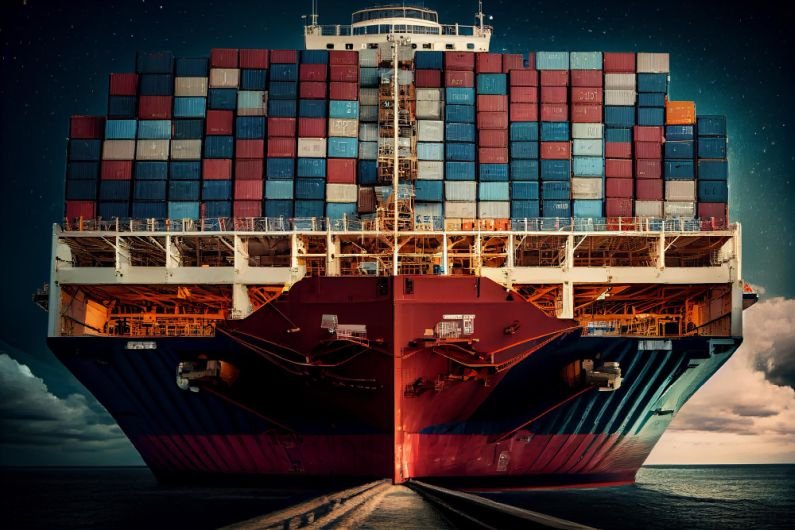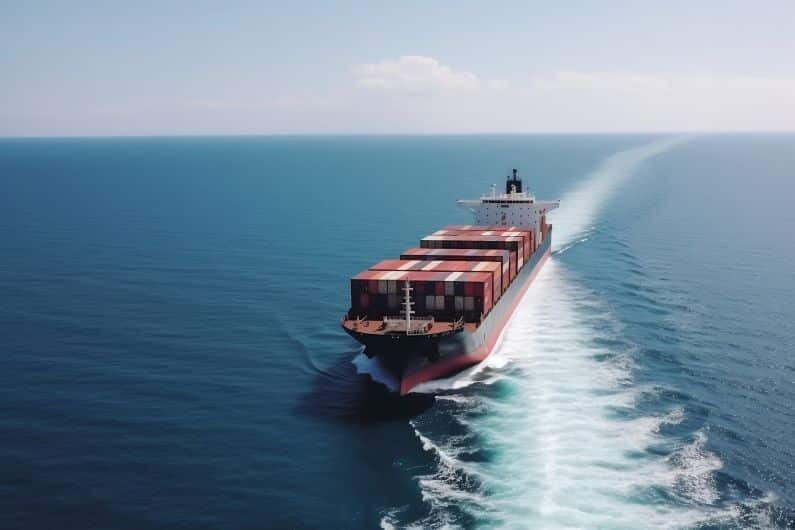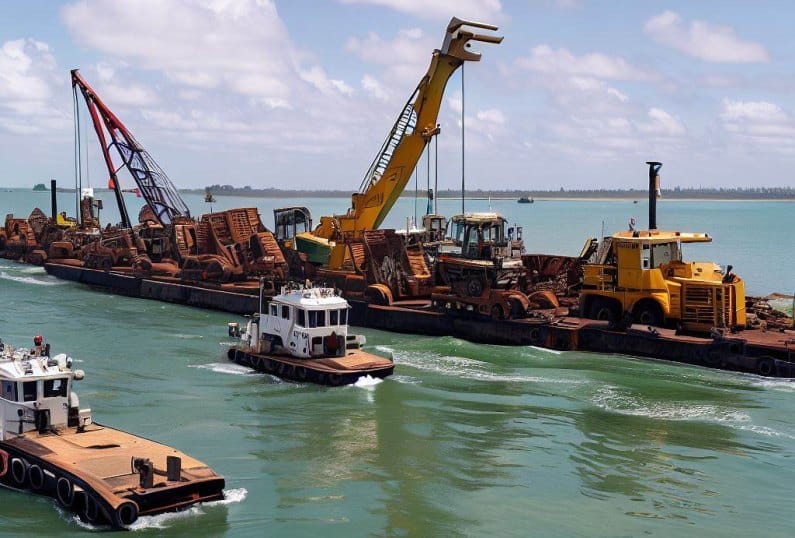Shipping equipment overseas involves a unique set of challenges and opportunities.
Whether it’s for oil and gas operations, construction projects, logistical setups, or engineering endeavors, efficiently and safely transporting heavy equipment in containers across borders is crucial for the success of various industries.
In this blog post, we’ll delve into the complexities of the international shipping process, covering everything from regulatory hurdles to packaging standards.
We’ll examine the different types of machinery commonly shipped abroad, highlighting specific considerations and best practices for each sector.
Join us as we unpack the essentials of shipping equipment overseas and its logistics.
Key Global Destinations for Shipping Equipment Overseas
Popular destinations for shipping equipment overseas from the US are primarily driven by regions undergoing significant industrial and infrastructural expansions.
Here’s a closer look at specific locations and the types of machinery these locations import, tailored to support various key industries:
United Arab Emirates: Known for its ambitious architectural projects and substantial investments in infrastructure, the UAE frequently imports cranes and loaders used in construction.
The region’s focus on developing its hospitality and entertainment sectors, which is estimated to hit 7 billion USD by 2026, also necessitates the need for shipping equipment overseas of heavy machinery from the US and other countries for constructing large-scale facilities and luxury properties.
Brazil and Mexico: Both countries are significant importers of agricultural machinery due to their vast natural resources and focus on agricultural development and urban construction projects.
Tractors, combine harvesters, and forestry equipment are in high demand in Brazil, while Mexico imports various construction machinery for housing and commercial development, reflecting their close economic ties with the US.
Africa (Nigeria and South Africa): These countries are pivotal players in the African continent’s growing construction and oil sectors.
Nigeria imports a variety of drilling equipment for its oil fields, while South Africa requires mining machinery to extract precious minerals and metals.
Both nations also invest heavily in crawler cranes and concrete machinery to bolster their urban development and accommodate growing populations.
Greece (Crete): With the recent discovery of new oil reserves off its coastline, Crete has emerged as a significant destination for heavy equipment related to the oil and gas industry.
This includes drilling rigs, offshore platforms, and subsea equipment essential for exploration and extraction activities. Greece‘s burgeoning energy sector demands specialized machinery and technology to tap into these newfound resources efficiently.
Additionally, Crete’s infrastructural development, spurred by its expanding energy industry, requires construction machinery for building new facilities and supporting infrastructure, further contributing to the demand for heavy equipment imports.
Chile: Known for its thriving mining industry, Chile is a prominent destination for heavy equipment imports, particularly in the mining sector.
The country is one of the world’s largest producers of copper, making it a magnet for the mining industry and equipment suppliers alike.
Chile’s rugged terrain and vast mineral reserves necessitate a wide range of heavy machinery, including excavators, dump trucks, and drilling rigs, to extract and process minerals efficiently.
Additionally, Chile’s commitment to renewable energy sources, such as wind and solar power, fuels the demand for heavy equipment related to infrastructure development and renewable energy projects.
These regions illustrate the global demand for heavy equipment, driven by diverse development goals and industrial activities.
Each country’s specific needs offer a snapshot of the types of machinery that are crucial for supporting their ongoing growth and infrastructural enhancements.
Shipping Equipment Overseas for the Oil and Gas Industry
The oil and gas sector depends significantly on the prompt and secure delivery of specialized heavy machinery, from drilling rigs to subsea pipelines.
Managing the shipping of such substantial equipment demands rigorous planning to accommodate its immense size and weight, as well as to meet the strict regulatory compliance required by various countries.
In this section, we’ll delve deeper into the logistics involved in transporting these critical components, highlighting the methods and services designed to ensure these heavy loads reach their destinations safely and efficiently.
Handling Oversized Loads: The transport of oversized heavy machinery in the oil and gas industry often utilizes flat racks—specialized shipping platforms ideal for accommodating the unique dimensions and weights of such cargo.
These racks provide the necessary support and accessibility for loading and unloading heavy items, making them a preferred option for items that exceed standard container sizes.
Navigating Regulatory Compliance: Each country has its own set of rules and regulations governing the import and export of heavy machinery, especially in the highly regulated oil and gas sector.
Organizations must meticulously prepare all documentation and ensure all equipment complies with the environmental and safety standards of the destination country. This often involves coordinating with local authorities and customs brokers to streamline the clearance process.
Choosing the Right Shipping Method: Selecting the most appropriate shipping method is key to balancing cost, speed, and safety.
While sea freight is often the most economical option for heavy and bulky items, it requires more extended transit times. Companies must weigh these factors based on the project timeline and the sensitivity of the equipment to delays.
Leveraging Expert Shipping Services: Partnering with a shipping company that specializes in heavy cargo for the oil and gas industry can add significant value.
These organizations offer specialized services and have the expertise and equipment to handle the specific needs of heavy machinery transport, from specialized loading gear to custom clearance services.
Through careful planning and employing the right methods and services, companies in the oil and gas sector can ensure that their heavy machinery is transported efficiently and safely, maintaining the operational flow and integrity of their projects across different countries.
Construction Equipment Shipping
Shipping heavy construction machinery such as bulldozers, cranes, and excavators internationally is pivotal for supporting global development projects.
This task requires meticulous planning and strategic execution to ensure safe, efficient, and cost-effective transportation. One of the primary strategies involves dismantling larger equipment into manageable parts.
This not only facilitates easier and safer loading and unloading but also optimizes container space, potentially lowering shipping costs by qualifying for standard container rates instead of oversized cargo fees.
Logistics Equipment Shipping
Logistics equipment, including forklifts, containers, and conveyor systems, plays a pivotal role in enhancing operational efficiencies at ports and warehouses worldwide.
Engineering Equipment Shipping
Shipping engineering equipment overseas, including turbines, generators, and precision instruments, requires meticulous attention to detail and a high degree of precision due to the sensitive nature of these items.
These components often necessitate controlled environments and shock-proof packaging to mitigate the risk of damage during transit.
Custom Crating Solutions: To protect sensitive engineering equipment, custom crating is essential. Tailor-made crates are designed to fit each piece of equipment perfectly, providing the necessary support and cushioning.
These crates are often constructed with specific materials that shield the cargo from environmental stresses and shocks encountered during shipping.
The quality of crating directly impacts the safety and integrity of the machinery, making it a critical consideration for any company looking to ship engineering equipment overseas.
Cost Considerations and Insurance: Shipping engineering equipment is often more expensive than other types of cargo due to the specialized handling and transportation requirements.
Obtaining accurate quotes from professional shipping companies, such as Texas International Freight, that include all potential costs—such as special handling, insurance, and customs fees—is crucial for budget planning.
Meeting International Standards: Each country has its regulatory requirements for importing machinery and electronic equipment.
Ensuring compliance with these regulations is a complex but necessary part of the shipping procedure. This involves a thorough understanding of export and import laws, certification needs, and potential tariffs.
Companies must have skilled personnel or partner with knowledgeable logistics providers to navigate these legal landscapes effectively.
Protecting Oversize and Heavy Equipment: Engineering equipment often involves oversized or particularly heavy items that require additional logistical planning.
From loading and unloading procedures to securing the right type of vessel for transport, each step must be carefully orchestrated. Special equipment like cranes or reinforced lifting gear may be necessary to handle these loads safely.
By emphasizing these key aspects—custom crating, climate control, cost management, compliance with international standards, and the protection of oversized items—companies can enhance their capabilities in shipping engineering equipment overseas.
This ensures not only the safety and integrity when shipping equipment overseas but also aligns with the company’s commitment to quality and reliability in its international operations.
Shipping Equipment Overseas – Other Items
While oil rigs, bulldozers, and forklifts might dominate discussions about shipping heavy equipment, many other sectors depend just as heavily on efficient and secure logistical solutions.
Industries like healthcare, entertainment, and technology often require the transportation of highly specialized and sensitive equipment across borders.
In this section, we’ll explore the diverse needs and unique challenges of shipping equipment for these niche markets.
Medical Devices
Shipping medical equipment such as MRI machines, X-ray devices, and surgical tools entails stringent regulatory compliance and handling precision.
These devices not only need to be packed in sterile, shock-proof environments to prevent contamination and damage but also often require temperature-controlled transport conditions.
For example, transporting a CAT scanner from the U.S. to a hospital in Kenya demands not just careful handling but also an understanding of import regulations for medical equipment.
Technology and Electronics
In the tech industry, shipping items like server racks, prototypes, or consumer electronics can involve both high-security measures and the need for speed.
Electronics are not only susceptible to damage from physical shocks but also from environmental factors such as humidity and temperature extremes.
Sports Equipment
Large sporting events require the transportation of vast amounts of sports equipment ranging from high-tech bicycles and pole vault poles to standard gym equipment and thousands of soccer balls.
These items require custom solutions for packing and handling to prevent damage during transit and ensure everything is competition-ready upon arrival.
Partnering With Texas International Freight for Your Shipping Needs
At Texas International Freight, we understand the challenges and nuances of shipping equipment overseas. As a leading freight forwarder, we are dedicated to providing tailored solutions that meet the unique needs of each sector.
Our expertise and commitment to service ensure that no matter the cargo or destination, your equipment will arrive safely, efficiently, and in compliance with all relevant regulations.
Whether you are an experienced logistics professional looking to streamline your operations or you’re new to the field and seeking guidance, Texas International Freight is your trusted partner in navigating the complex landscape of international shipping.
Let us help you optimize your shipping strategy, reduce risks, and achieve a seamless logistical operation worldwide. Partner with us to ensure your shipments are handled with the care and expertise they deserve.





